Talking With Lawrence Grobel (Ghana)
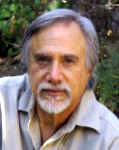 Lawrence Grobel (Ghana 1968-71) has written 31 books and for numerous national magazines and newspapers. Playboy called him “the Interviewer’s Interviewer” after his interview with Marlon Brando for their 25th-anniversary issue. He created the MFA in Professional Writing program for Antioch University in 1977 and in 1985 his book Conversations with Capote received a PEN Special Achievement award and reached the top of several bestseller lists. He is married to
Lawrence Grobel (Ghana 1968-71) has written 31 books and for numerous national magazines and newspapers. Playboy called him “the Interviewer’s Interviewer” after his interview with Marlon Brando for their 25th-anniversary issue. He created the MFA in Professional Writing program for Antioch University in 1977 and in 1985 his book Conversations with Capote received a PEN Special Achievement award and reached the top of several bestseller lists. He is married to  artist and textile designer Hiromi Oda and they have two daughters, Maya and Hana.
artist and textile designer Hiromi Oda and they have two daughters, Maya and Hana.
His blog, books, and articles can be found on his website: www.lawrencegrobel.com. We interviewed Larry in connection with his new memoir — Turquoise — of his Peace Corps years in Ghana.
•
Larry, why the Peace Corps?
When I turned 21 in February 1968, I had to start thinking seriously about my future, and whether I’d have one. The Vietnam War was raging, with over a half-million U.S. troops involved and young men my age continued to be drafted into the Army. The Tet Offensive had just taken place, where the North Vietnamese attacked over a hundred cities and outposts in the South, convincing American anti-war protestors that the war wasn’t going to end well for the U.S.
I was five months from graduating from UCLA. I had applied to the Peace Corps, and was contemplating graduate school, but knew that it wouldn’t defer me from the draft. When Dr. Martin Luther King Jr. was assassinated in April, I knew that our country had gone mad, and I wanted to getaway. I had been accepted into the Peace Corps and assigned to Ghana. I still worried about being drafted and had decided that there was just no way I could go into the Army and fight against people I had no reason to fight. I was in Los Angeles when Senator Robert Kennedy was assassinated in June, and that did it for me. I had met Kennedy in his office when he was his brother’s attorney-general six years earlier. I thought he was going to become president in ’68, but with him gone, and President Lyndon Johnson had decided not to run again, Nixon looked like the guy who would take over the war. I certainly wasn’t going to have him decide my fate.
I knew nothing about Ghana. In fact, when I got my assignment, I mistook Ghana for Guyana. But it didn’t matter. Wherever they wanted to send me, I was willing to go. As long as it wasn’t to Vietnam
What was your Peace Corps assignment?
Because I was a columnist for UCLA’s Daily Bruin and the editor of Satyr, the campus humor magazine, for 3 years, I apparently qualified to be assigned as a teacher at the Ghana Institute of Journalism. I was told this: “It’s a sensitive assignment. You’d be teaching and working with journalists from all over Africa, and anything you say could end up in the media. So, the question we have is, do you consider yourself a tactful person?”
“Are you asking if I won’t say anything about the war, if I’m asked?”
“You’re free to say anything you want. But if something you say is controversial, and if one of your student journalists writes about it, it could become an issue. Not just the war, it could be anything. If it blows up, then we wouldn’t be able to come to your defense, other than to get you safely out of the country.”
I’ve always been a person who loves a challenge. I was all-in.
So, in-country where were you assigned?
The Institute was in Accra, so I had a city experience. Though I did travel extensively whenever I could, to the Ivory Coast, Upper Volta (Burkina Faso now), Togo, Dahomey and to East Africa, to Ethiopia, Kenya, Tanzania, and Uganda.
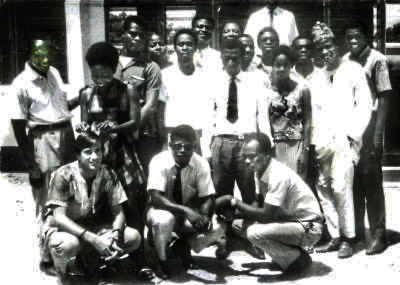
Larry with students
And your assignment?
The Institute wanted me to teach Journalism, but I thought that it should be taught by a qualified Ghanaian journalist. So, instead, I taught Literature, Creative Writing, and Current Events. You can read about it in my book.
You have published 31 books. What genres?
In the last 36 years, I’ve somehow managed to write 2 novels, 3 books of short stories, 2 novellas, 2 memoirs, a book of poems about celebrities, 2 volumes of four screenplays, 8 Conversations With books, a satire on yoga, and 10 books of nonfiction.
 My first book was Conversations with Capote, that came out six months after Truman Capote died. I had been interviewing Capote for Playboy, but when the managing editor at the time, in his mistaken wisdom, decided it was “too gay” to publish, I bought it back from the magazine. It wasn’t difficult to get published; it’s been translated into a dozen languages, and it received a lot of attention. In other words, it spoiled me into thinking that all my future books would also receive attention. That, obviously, did not happen.
My first book was Conversations with Capote, that came out six months after Truman Capote died. I had been interviewing Capote for Playboy, but when the managing editor at the time, in his mistaken wisdom, decided it was “too gay” to publish, I bought it back from the magazine. It wasn’t difficult to get published; it’s been translated into a dozen languages, and it received a lot of attention. In other words, it spoiled me into thinking that all my future books would also receive attention. That, obviously, did not happen.
Is Black Eyes of Akbah fiction or non-fiction?
It’s definitely fiction. It came to me in a dream. A very disturbing dream, about two Peace Corps Volunteers at the end of their tour, who decide to travel together 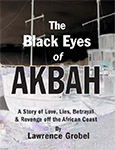 from their host West African country to East Africa, where they got on a cargo ship to the Seychelles and to India. They fall in love, but things go badly for them on the ship, and they lose their innocence and their idealism.
from their host West African country to East Africa, where they got on a cargo ship to the Seychelles and to India. They fall in love, but things go badly for them on the ship, and they lose their innocence and their idealism.
It was the first time I ever wrote notes about a dream. I put them away and then, a few years later, I had the same dream. I took more notes, but I didn’t want to write about it. Too disturbing.
Another few years went by, and it happened a third time. So, I had no choice, I felt I had to write the story to get it out of my mind. I called it The Black Eyes of Allah, which was the name of the ship in my dream. I sent it to Oliver Stone, and he called me to come to his office. He asked where I got the story. I told him in my dreams. He said he’d like to partner with me, I’d write it, he’d produce and possibly direct. I said, I’d prefer being paid to write it. He agreed. So, I turned the story into a screenplay. But then, Stone had a falling out with his business partner and decided he only would work on his own projects, so I got it back.
 I published the story as an eBook as The Black Eyes of Akbah, because friends suggested I don’t use the word “Allah.” But I also included it in my first book of stories, The Narcissist, using “Allah.” I even published the screenplay, along with one I wrote about my time with Brando. So, if anyone reading this is interested, they’re available!
I published the story as an eBook as The Black Eyes of Akbah, because friends suggested I don’t use the word “Allah.” But I also included it in my first book of stories, The Narcissist, using “Allah.” I even published the screenplay, along with one I wrote about my time with Brando. So, if anyone reading this is interested, they’re available!
It wasn’t based on my Peace Corps experience. But it is about some volunteers at the end of their service.
You have had conversations with a lot of famous people, actors, and writers. Who, among all the celebrities you’ve interviewed or known, would you miss if they were no longer around?
Of those who have already passed, I’d say John Huston, because I appreciated our conversations and his interest in my work; Truman Capote, because he said so many hilarious and outrageous things; Luciano Pavarotti, because I enjoyed his company and looked forward to seeing him in Italy, which would have been the best reason to travel to Italy; Robin Williams, because he was so quick and so down-to-earth; Miles Davis, because he was Miles Davis!; and Farrah Fawcett, because I miss our paddle tennis games, and her being “one of the guys” whenever we got together.
Of those still around, Elliott Gould, because he has become like family and is one of the truly special people I know; Christopher Walken, because he always responds to my calls, and when I send him a book of an author I think he might like, he sends me one back; Kim Basinger, because though she’s so shy, we have long phone conversations that cover whatever’s on our minds; Joyce Carol Oates, because even though she’s a goddamn genius, she always makes time to get together whenever she’s in town; and Lily Tomlin, because how can you not love Lily Tomlin?
What were some of your best interviews?
I’d like to think that all my work is the best that I can do at the time, but I guess that the ones that have turned into books are the ones that most people 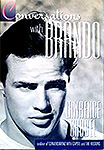 remember: Truman Capote, Marlon Brando, James A. Michener, John Huston, Al Pacino, Robert Evans, and Ava Gardner. Though I should also include the ones that got the most publicity: with Gov. Jesse Ventura, and with Coach Bob Knight. The Ventura one wound up being covered by all the morning news and talk shows and put the Governor on the cover of Newsweek for his controversial remarks about religion, prostitution, sexual abuse in
remember: Truman Capote, Marlon Brando, James A. Michener, John Huston, Al Pacino, Robert Evans, and Ava Gardner. Though I should also include the ones that got the most publicity: with Gov. Jesse Ventura, and with Coach Bob Knight. The Ventura one wound up being covered by all the morning news and talk shows and put the Governor on the cover of Newsweek for his controversial remarks about religion, prostitution, sexual abuse in 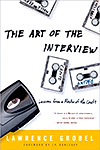 the Navy, fat people, and hoping to be reincarnated as a 38 DDD bra. As for Knight, he tried to throw me out of his car twice, fought with me over the tapes, punched me in the ribs, and I wound up putting that interview at the end of my Art of the Interview book to demonstrate how an interview is really like a 3-act play.
the Navy, fat people, and hoping to be reincarnated as a 38 DDD bra. As for Knight, he tried to throw me out of his car twice, fought with me over the tapes, punched me in the ribs, and I wound up putting that interview at the end of my Art of the Interview book to demonstrate how an interview is really like a 3-act play.
Have you seen a change in the publishing world because of the shift to ebooks and Kindle?
More than a shift, closer to an earthquake. Publishers no longer want to invest in a writer, allowing an audience to grow over time. Now, they want to know about the writer’s social media presence. They don’t want to give out big advances. They pigeonhole writers. At least, that’s what I experienced.
My agents (and I’ve had a few, until I decided to have none) didn’t want to hear about my fiction or my memoir or yoga satire (they thought that one “beneath” me). What they wanted was for me to continue writing about celebrities, as I did with The Hustons biography, or the books about Capote, Brando, Pacino. I had other ideas that I wanted to pursue, and I knew I had to choose between writing commercially for money, or self-publishing to keep me sane and happy.
How important is Amazon in the publishing world?
Discussing Amazon is complicated.
Most writers will not be able to make a living self-publishing. I know if I depended on the sales of all my books, I wouldn’t be able to support myself, let alone my family. I continued to write for magazines, and I taught at UCLA for ten years. So, my books were a bonus, and I got lucky. Amazon was looking for some established writers to show that not all the books they published were written by amateurs or were sloppily edited. They approached me and said they’d put out my books in a way that would please me. I was skeptical but decided to give them a manuscript I had written about my time with Ava Gardner. It appeared ten years ago, and to my surprise, it still sells a few books every week. I then gave them my memoir, some collections of articles I’d written for magazines, and my fiction. If I waited for commercial publishers to put these books out, I might still be waiting. So, in that sense, I can’t complain. I’m a writer who likes to write, and to see my books get out into the world. I may not have the number of readers I had for my first dozen books, but I do hear from people around the world who have somehow managed to find my work, and that’s satisfying.
surprise, it still sells a few books every week. I then gave them my memoir, some collections of articles I’d written for magazines, and my fiction. If I waited for commercial publishers to put these books out, I might still be waiting. So, in that sense, I can’t complain. I’m a writer who likes to write, and to see my books get out into the world. I may not have the number of readers I had for my first dozen books, but I do hear from people around the world who have somehow managed to find my work, and that’s satisfying.
Do you work with publishers now or just with Amazon?
I still get royalties from the publishers who put out The Art of the Interview, the Al Pacino book, and The Hustons, so I deal with them. And occasionally, I’ll try to do an end run around the publisher’s rule that they will only deal with agents, not individual writers, and try to interest a publisher in something I’ve written. But that doesn’t work. I admit that after I finish a book, I think about submitting it to a commercial publisher, but then I remember how frustrating that can be, and how much simpler it is for me to put it out on Amazon. I live with the belief that one day, while I’m still alive, something will happen where my work will get known to a wider audience, and I’ll be “discovered.” It’s a false hope, I know. But writers must be dreamers . . . and have thick skins.
What Peace Corps writers (if any) have you read?
I have several books on my shelves by Bob Shacochis, Paul Theroux, Mark Jacobs, Chris Matthews, Larry Leamer (wait! I have to interrupt this because the phone just rang — it was Larry Leamer calling to congratulate me on my Peace Corps book. “Larry,” I said, “this is freaky, but I just wrote your name in a response to a question about PC writers.” Spooky).
I have the oral history, What You Can Do for Your Country, and the travel essays Going Up Country edited by the PC’s greatest cheerleader, John Coyne. I also have One Hand Does Not Catch a Buffalo — 50 Years of Amazing Peace Corps Stories: Volume One: Africa, but I contributed to that one.
You write that you just rediscovered the original text you wrote years ago?
 I had been working on my third book of short stories, Stuck, and was thinking about some of the stories I had written in Ghana. I started looking through my files and found three stories that I thought would work in the new book (“Ask the Devil, Who’s Taken My Eyes;” “Fetish;” and “All Die Be One Die.”)
I had been working on my third book of short stories, Stuck, and was thinking about some of the stories I had written in Ghana. I started looking through my files and found three stories that I thought would work in the new book (“Ask the Devil, Who’s Taken My Eyes;” “Fetish;” and “All Die Be One Die.”)
I also found a manuscript I had written that I called Turquoise. It was typed on legal-sized paper and was probably 200,000 words long. As I read it, so much of my time in Ghana came back so vividly that I thought it might be worth publishing. But I also saw that a lot of it had to do with a  relationship I had had in the States that I didn’t find relevant or interesting, so I cut that out, along with parts that were overwritten. I was able to edit it down by half. I know I left out some stories (being locked in the dungeon of a slave castle; negotiating with pygmies in Uganda), but I had covered those in my memoir, You Show Me Yours.
relationship I had had in the States that I didn’t find relevant or interesting, so I cut that out, along with parts that were overwritten. I was able to edit it down by half. I know I left out some stories (being locked in the dungeon of a slave castle; negotiating with pygmies in Uganda), but I had covered those in my memoir, You Show Me Yours.
I wanted Turquoise to be fresh, and to give the reader a feeling of being there with me.
What are you working on now?
I’m working on three books right now. One is a novel based in West Africa that I began some years ago and received a National Endowments of the Arts Fellowship for the first fifty pages. I put it aside when the journalism picked up, but I’d really like to get back to that. Another is a collection of work I did for newspapers and magazines that I’d like to preserve. And the third is editing my 2-million-word journal, because so much of it covers the behind-the-scenes of the interactions I’ve had with so many famous people. I began keeping this journal in 1976, when I was involved with interviewing Barbra Streisand for Playboy over a period of nine months. That chapter in my life is also covered in my memoir, along with the time I spent with Marlon Brando on his island. But I’ve covered my friendships with people like Al Pacino, Elliott Gould, Dolly Parton, and Diane Keaton, and my dealings with hundreds of others I’ve gotten to know. So, maybe one day a few volumes of that might appear.
Larry, many thanks for the interview and many thanks for your books. You prove again that RPCVs are a literary crowd.
John,
What a ‘moveable feast’ that was to be treated to Lawrence’s literary journey since his days as a PC Volunteer in Ghana! Great thanks for that memorable interview.
Sincerely,
Jeremian Norris
I put off brewing my mandatory first cup of coffee to enjoy an interview with an interviewer about interviews. What a treat!
I was with Larry in the Peace Corps (Ghana ’68 to ’70), and back then in the misty reaches of a distant past he talked about Turquoise. I was 22 years old and in thrall with Africa. I lived on the outskirts of Accra in the servant’s quarters of a house. Every weekend I’d go into the city to Larry’s magnificent apartment with three overhead fans and soft chairs. There we would drink tea and read poetry, not just our own but that of Eliot, Edith Sitwell, Vachel Lindsay, Gertrude Stein, Ginsberg, G.M. Hopkins…the list went on.
Sitting there then as a 22 year old, anticipating a glorious life ahead, it would not have been possible, even in my wildest imaginings, that at 75, near the end of the road, I would be reading Turquoise and experiencing again the playfulness of it all.